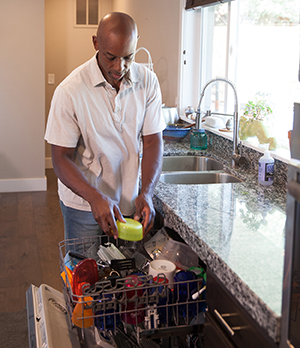Salmonella Infection (Salmonellosis)
Salmonella infection (salmonellosis) is an illness that affects your intestines. It is caused by Salmonella bacteria. You can be infected by eating or drinking contaminated food or water. Beef, pork, chicken, eggs, and unpasteurized milk are more likely to carry this bacteria than other foods. But vegetables may also be contaminated. Salmonella most often passes through food that hasn’t been cooked well enough. Or food that contains raw meat or eggs. You can also be infected by contact with the stool (feces) of infected animals. Or by food that an infected food handler contaminates.
 |
| To prevent transmission of Salmonella, wash all utensils, dishes, and cutting boards with soap and hot water, especially after preparing raw meats or eggs. |
Common symptoms of Salmonella infection
Symptoms often start 12 to 72 hours after you are infected. Symptoms include:
-
Fever
-
Stomach cramps
-
Diarrhea
-
Headache
-
Muscle pain
-
Vomiting
-
Upset stomach (nausea)
Diagnosing Salmonella infection
A healthcare provider takes a sample of your stool and checks for Salmonella. More than 1 stool sample may be needed.
Treating Salmonella infection
Most otherwise healthy people get better in 5 to 7 days. You will often not need medicines that treat bacterial infections (antibiotics). But if you have other health problems, your symptoms are severe, or the infection is spreading to other parts of your body, you will need antibiotics. An important part of the treatment is fluids. Drink plenty of fluids while you are sick and recovering. This helps prevent fluid loss (dehydration). Don't take anti-diarrhea medicine unless your provider tells you to. This medicine can prevent your body from getting rid of the bacteria. It can also make the illness last longer.
When to call the healthcare provider
Call your healthcare provider if you have any of these:
Preventing Salmonella infection
Follow these steps to reduce your chances of getting or passing on Salmonella infection:
-
Wash your hands well with soap and clean, running water. Or use an alcohol-based hand cleanser that contains at least 60% alcohol. Do this often. Always wash your hands before making meals. Contaminated foods often have no abnormal smell or look. This is why it is important to know how to prevent infection. Wash after going to the bathroom, changing diapers, helping someone who has diarrhea, or handling pets or other animals. Teach your child to do the same. Scrub for at least 20 seconds. Scrub under your fingernails and between your fingers. While you wash, sing the ABC song or the Happy Birthday song to reach the 20-second goal. Use a towel to dry your hands and open the door.
-
Use a food thermometer when cooking. Cook poultry to at least 165°F (74°C). Cook pork and ground meats to at least 160°F (71°C). Cook beef or lamb to at least 145°F (63°C). Cook eggs until the yolks are firm and not still runny.
-
Wash or peel fresh fruits and vegetables before eating.
-
Wash cutting boards and utensils with hot water and soap after each use. After preparing raw meat or eggs, clean boards and counters with hot water and soap.
-
If you have a Salmonella infection, don't make drinks or food for others until you no longer have diarrhea.
Online Medical Reviewer:
Heather M Trevino BSN RNC
Online Medical Reviewer:
Marianne Fraser MSN RN
Online Medical Reviewer:
Rajadurai Samnishanth
Date Last Reviewed:
4/1/2024
© 2000-2025 The StayWell Company, LLC. All rights reserved. This information is not intended as a substitute for professional medical care. Always follow your healthcare professional's instructions.